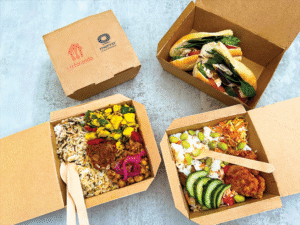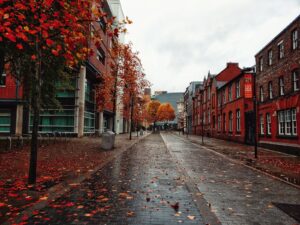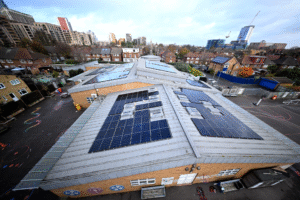We Feed The UK celebrates regenerative farming and sustainable food production across Britain, and will tour the UK until April 2025.
Working at the allotments at Lauriston Farm, Edinburgh, (C) Sophie Gerrard’‘Farmers and food producers are crucial players in our fight to tackle the climate and biodiversity crises. Across the UK, regenerative farmers are galvanising communities to think differently about how we produce and consume our food.’
It doesn’t take long to see where Ally Nelson is coming from. As the lead on The Gaia Foundation’s major new project, We Feed The UK, she’s spent recent months working alongside some of the most progressive agricultural operations in Britain, with one clear goal. Bring these vital businesses together with talented photographers and spoken word artist who can creatively articulate and convey why these people, and their efforts, need to be celebrated and recognised by the general public.
Opening on Thursday 8th February at Liverpool’s Open Eye Gallery, the exhibition is a follow up to We Feed The World, which spotlit smallholders across the globe with a similar objective — bust open the myth that in order to provide enough food for everyone, society has to rely on industrial agriculture. But this time round the focal points are much closer to home, with organisations plucked from England, Northern Ireland, Scotland and Wales.
‘We Feed The UK will help the public cultivate a stronger connection to local food and influence other farmers and food producers to transition towards regenerative practices,’ Nelson continues. ‘[It] celebrates their role as custodians of sea, soil and seed, through the powerful mediums of photography and spoken word… With exhibitions taking place across the UK in 2024-25.’
The range of projects included is dazzling and almost dizzying. In Wales, where 80% of the land is used for farming, The Penpont Project is a leading example of agroforestry leading to afforestation and eco-tourism with an educational element. Amazingly, this is led by a co-management council including young people aged between 13 and 18 years old, alongside tenant farmers, the Action for Conservation charity and landowners. Ifor ap Glyn’s poetry and images by Andy Pilsbury help showcase this best-in-class endeavour.
Black Rootz Wolves Lane Centre (C) Arpita ShahElsewhere, the Black Country’s No Diggity is nourishing soil devastated by the toxic legacy of the region’s industrial heritage, with six allotments running a no-dig, organic, zero waste approach. Ayesha Jones’s stunning shots are complemented by the words of Polish emigre in Birmingham, Borden Piasecki.
In the capital, Go Grow With Love and Black Rootz are respectively teaching residents in Tottenham and Haringey agricultural skills — from nursery age kids to the adult community, and establishing the first multigenerational Black-led growing enterprise. Both are contributing to tackling the racial inequalities endemic in sustainability and climate industries and action, with just 6% of green charity staff identifying as a person of colour and minorities far more likely to have limited access to nature compared with white Britons.
Meanwhile, in Cumbria, James Robinson’s 300-acre farm is using habitat restoration to help bring back pollinators which three-quarters of our food crops rely on, but are rapidly disappearing from the UK countryside. Efforts Johannes Pretorius has immortalised in photos and rapper, playwright and beatboxer Testament conveys with prose.
Sustainable fishing with Sole of Discretion (C) Jon TonksElsewhere, incredible endeavours in Edinburgh (the 100-acre Lauriston Agroecology Farm urban growing plot), and Eastbourne (where Sole of Discretion has become the first ever fully traceable fishery in the country) are also included, with input from creatives such as Jon Tonks, Street Level Photoworks and Lua Ribeira.
‘We Feed The UK is important in getting positive stories to the public – the current vilification of farmers needs to stop. There are small pockets of us trying to be better, which We Feed The UK can help the consumer see and understand, whilst also offering hope to farmers stuck in an imperfect system,’ says Stuart Johnson, Soil Farmer of the Year 2023, whose family farm in Northumberland benefits from home brewed compost, a chemical-free resource restoring vital nutrients to the ground. ‘This project proves that there are other ways to do it that can not only enhance biodiversity and battle climate change, but also bring people together and improve financial performance. Everyone wins and that story needs to be told.’
While it’s easy to centre attention on The Gaia Foundation’s initiative as a purely celebratory process, the future benefits of this project should not be understated. Art and culture are one of the most effective ways of public message delivery, and over the past year we’ve seen evidence of this, from a research programme commissioning artist to produce ‘climate comics‘ to the launch of a new sustainability film competition in British schools.
With the need to start thinking much more carefully about what we eat, how much, and where that food comes from only growing in urgency, and agriculture currently accounting for 10% of Britain’s overall emissions – 69% of total nitrous oxide and 48% of all methane emissions – projects like We Feed The UK could no be more important. In an age when misinformation, disinformation, fearmongering and scapegoating around environmental stories, policies and investments is becoming more audible, cutting through the noise is something both private and public sector organisations need to do much more effectively
Intergenerational nature restoration at Penpont Estate, Wales (C) Andy PilsburyWe Feed The UK will operate monthly residences with specific focal subjects over the next 14 months:
- February – Agri-culture: A Lineage of Hedgerow Ligging | Inspired by Strickley Farm, Cumbria | Poetry by Testament | Photography by Johannes Pretorius | Exhibited at Open Eye Gallery in Liverpool
- April – Cultivating Equality: Women Working with Land | Inspired by Grampian Graziers & Lauriston Agroecology Farm, Scotland | Poetry by Iona Lee | Photography by Sophie Gerrard | Exhibited at Street Level Photoworks in Glasgow
- May – No Diggity: Keeping Carbon Underground | Inspired by No Diggity Gardens, the Black Country | Poetry by Bohdan Piasecki | Photography by Ayesha Jones | Exhibited with Multistory at No Diggity Gardens in Walsall
- June – Custodians of the Land: Intergenerational Nature Restoration | Inspired by Penpont Estate, Wales | Poetry by Ifor Ap Glyn | Photography by Andy Pilsbury | Exhibited at Penpont Estate in Wales
- September – From Crisis to Kinship: Healing People and Place on England’s First Community-Owned Farm | Inspired by Fordhall Organic Farm, Shropshire | Poetry by Jasmine Gardosi | Photography by Aaron Schuman | Published with GRAIN Projects as an immersive book
- October – Food Justice: Served Fresh from Community Farms | Inspired by Go Grow With Love & Black Rootz, London | Poetry by Zena Edwards | Photography by Arpita Shah | Exhibited with Photo Fringe in London and at ONCA Gallery in Brighton
- November – Down to Earth: Restoring our Soils | Inspired by Wharmley Farm, Northumberland | Poetry by Kate Fox | Photography by Johannah Churchill | Exhibited with NEPN (North East Photography Network) at The Sill: National Landscape Discovery Centre in Northumberland
2025:
- January – Fibre: Nature-Friendly Flax Farming | Inspired by Mallon Farm, Northern Ireland | Poetry by Abby Oliveira | Photography by Yvette Monahan | Exhibited at Belfast Exposed in Northern Ireland
- April – In Deep Water: Sustainable Fishing | Inspired by fishers along the South coast | Poetry by Chris Redmond | Photography by Jon Tonks | Exhibited at Martin Parr Foundation in Bristol
- April – A Food Revolution Starts with Seed: Grain Rebels | Inspired by Gothelney Farm and Field Bakery, Somerset | Poetry by Dizraeli | Photography by Lúa Ribeira | Exhibited at The Royal Photographic Society in Bristol
More features:
How to put sustainability at the centre of your digital transformation
Port Talbot: an omen of environmental and economic policy disconnect
Green futures: a masterclass in inclusive, sustainable community placemaking
















